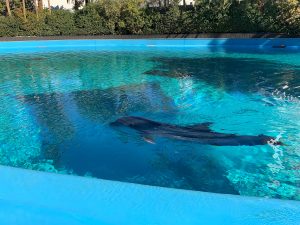by Abbey Huffer

Whether you love animals or not, it is obvious that most zoos do not always treat their animals with the utmost care. Rescue zoos that take in endangered animals or animals that can’t care for themselves in the wild are obviously exempt. I’m referring to zoos that take in fully healthy animals and confine them in small enclosures, isolating them from their species and their natural habitat.
It’s important to speak for wildlife as they have literally no voice to speak up for themselves. The sole purpose of zoos seems to be to put animals on display for mankind’s entertainment. Not only is it morally wrong, but it’s normalized abuse. Animals in zoos are forced to live in artificial, stressful, and downright boring conditions. Removed from their natural habitats and social structures, they are confined to small, restrictive environments that deprive them of mental and physical stimulation. While zoos claim to provide conservation, education, and entertainment, their primary goal is to sustain public support in order to increase profits.
“We are holding animals in captivity for our entertainment,” sophomore Rae Johnson said. “Not only is it messed up within itself, but they also aren’t meant to be held in a small area for long periods of time. They’re not like our pets who are domesticated; these are wild animals.”
Wild animals are meant to be left in the wild because holding them in enclosures suppresses their natural instincts. It frustrates the animals as they’re not getting enough freedom, potentially making the animals want to harm themselves or the people around them. In the incident of “Tilikum,” a killer whale that was trained at “SeaWorld” rebelled against his trainers in February 2010, which led to the death of Dawn Brancheau. This is sadly not the only time an incident occured where someone was harmed. Another well-known story is the incident of “Harambe,” which occurred in May 2016. The incident happened when a three-year-old boy climbed into the enclosure and was dragged and killed by the 17-year-old gorilla known as “Harambe.” Many online agreed that the boy’s parents were at fault for leaving their son unsupervised, but a zoo worker shot and killed Harambe nonetheless. Both stories are graphic and have depressing results. Wild animals are not meant to be put in our hands.
“I think that some zoos do abuse animals, but some vary from others,” sophomore Seth Alirez said. “Putting a big range animal like a whale in captivity is abusive, yet other zoos take care of endangered species, which is beneficial. What we could do to solve this problem is attempt to monitor which animal is actually benefiting from being in captivity and which ones are being harmed by it. An example of this is instead of making an exhibit for a whale, just make a boat trip that people can do at an aquarium in a larger scale area. It might not be as cost-efficient, but it will be way more long-lasting and beneficial for the environment.”
There are ways we can help animals at home. You can donate to funds such as The Humane Society, the Animal Legal Defense fund, and the Cruelty Free International fund. Stop contributing to companies that profit off of animal cruelty. The makeup brands or skin-care products you might use could be tested on animals, which sickens the animals as they are filled with toxic chemicals. Last but not least, if you are interested in visiting animals, go to an animal sanctuary instead of a roadside zoo. Sanctuaries are more beneficial to the animals as they have less human interaction and have the possibility of being re-released. Animals are crucial to human survival, and without them, humans would potentially go extinct as we would have lost a huge part of our ecosystem. It’s important to treat them with care, or just simply leave them alone.











